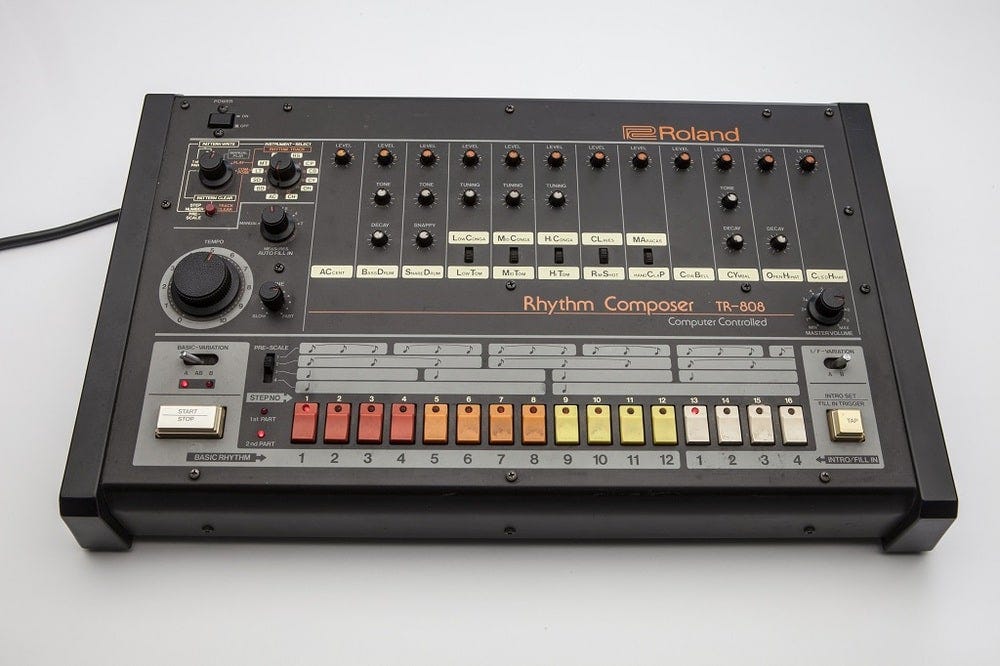Some breakthroughs start with failure. A machine built for one purpose flops, and the market shrugs. But then someone picks it up – often because commercial failures are cheap – and uses it the “wrong” way to spark something new. One of these flops was the TR-808 from Japanese company Roland. Launched in 1980 with a list price of $1,195, it was a commercial disaster. Only 12,000 units were sold. Today, these same machines are highly sought after, with well-preserved units fetching as much as $9,000.
The TR-808 is a drum machine. Roland marketed it as a tool for musicians to record demos and create backing rhythms. But its synthetic sounds didn’t meet the era’s preference for realistic digital drum samples. “They did it the best they could with the analogue technology, and it sounded shit,” as one Roland product manager puts it.
If you were a broke musician in the 1980s, the TR-808 was heaven-sent. You could find one in a pawn shop for as little as $100. All it took to use the machine was a willingness to let go of narrow ideas about how drums (or music, for that matter) were supposed to sound.
Early adopters like Jeff Mills, Derrick May, and Kevin Saunderson (all from Detroit) used it to create something rare. The first truly new sound since the birth of rock & roll: techno. Raw, hypnotic, and mechanical. Stripped of funk’s warmth and disco’s gloss, with rigid rhythms and synthetic textures.
Today, electronic dance music is a $12 billion market. That entire industry likely wouldn’t exist if a handful of outsiders hadn’t leaned into failure, and pushed to solve their real constraints instead of chasing idealized visions.
You don’t have to be interested in music to appreciate what this story reveals: breakthroughs rarely emerge from perfect conditions. They come up when people stop wishing the world were different and start building from where they actually are.
It’s almost the exact counterpoint to how many leaders think the world works. They pretend everything follows policy PDFs and expert projections. But reality doesn’t bend to your will. All you can do is play the pieces as they lie.
That kind of blindness is the reason I started The Brawl Street Journal. Too many outlets covering Europe’s economic policies take bureaucratic schemes at face value, even when they clearly won’t work as intended.
It’s something I wish I’d had when I started my career as a lawyer. Working at a big firm doing very well off the Net Zero agenda, I was too consumed by the daily grind to step back and question what we were actually doing. BSJ is my way of correcting that.
This may be an anonymous newsletter, but I want to be as authentic and transparent with you as I possibly can. That’s why each month, I’ll share the progress of growing BSJ. A little more than six months in, here are the stats as of 11 June, 2025:
Articles published: 33
Email subscribers: 1,134
Total views: 55,144
I launched from zero because I didn’t have the benefit of seeding BSJ through my own network (anonymity and all). So to call these numbers exciting would be an understatement.
Every time I hit “publish,” I’m aware I’m speaking to the equivalent of a packed lecture hall. And because your attention is one of the most valuable things you can give, I aim to earn it – with sharp, original analysis in every piece.
Just like Mills, May, and Saunderson used the tools they had – cheap machines and no permission – to create something new, I’m using the tools I have: a law degree, a trained eye for patterns, and a habit of thinking in second- and third-order consequences.
But I need your help to keep the momentum growing. If you’re reading this and haven’t yet subscribed, please take a moment and do so now. If you enjoy a particular BSJ piece, please consider sending it your friends. It costs you nothing but means everything to me. My goal is to uncover the ripple effects that shape our world. The more people are aware of them, the better.
And if you’ve made it this far: thank you!






Synthesizers were created to allow musicians play sounds from traditional instruments and ended being used to play sounds that no traditional instruments could make. This is definitly something to think about.
Thank you - I greatly appreciate your sharing these articles with your readers.